Address any questions or comments regarding this newsletter to the individual authors listed after each article or to its editors, Nathan Johanning, 618-939-3434, njohann@illinois.edu or Bronwyn Aly 618-695-6060, baly@illinois.edu. The Illinois Fruit and Vegetable News is available on the web at: http://ipm.illinois.edu/ifvn/. To receive or be removed from email notification of new postings of this newsletter, contact Nathan Johanning or Bronwyn Aly at the phone numbers or email addresses above.
In This Issue:
Upcoming programs (listings for beginning and established growers)
News & Announcements (2021 Southern Illinois Fruit and Vegetable Virtual School – February 10, 2021, Local Food Systems and Small Farms Extension Educator Team Continues To Grow, Illinois Pesticide Applicator Training and Testing, M-CERF Illinois Producer Survey)
Regional Reports (southwestern Illinois (Waterloo), southern Illinois (Murphysboro), Dixon Springs)
Fruit & Vegetable Production & Pest Management (Farms needed for No-till, Cover Crop Tomato & Pepper Demonstration Trials, 2020 Pumpkin Variety Trial Yields & Videos Released, Weather Review: Warm, Dry End to 2020, New Asparagus Varieties and Sources)
Upcoming programs
See the University of Illinois Extension Local Food Systems and Small Farms Team’s website at:
http://web.extension.illinois.edu/smallfarm/ and the calendar of events at http://web.extension.illinois.edu/units/calendar.cfm?UnitID=629.
- 2021 Small Farms Winter Webinar Series, Thursdays starting at noon, from January 21 - March 25, 2021. Plan to spend your lunch hours learning more about local food and small farm related topics this coming year. Registration information coming soon!
- Purdue Extension Vegetable Farming Webinar Series, Every Wednesday in February, starting February 3, 2021, 2 PM to 4 PM EST. For more information or to register visit https://www.indianahortconference.org/.
- 2021 Southern Illinois Fruit and Vegetable School, Wednesday, February 10, 2021. See registration information and conference details below!
- 2021 25th Annual Stateline Fruit and Vegetable Growers Conference. This year, our conference will be delivered via the Zoom platform. Because of the breadth of content, our conference will be held over multiple dates. These webinars will be held live. The core of the program, fruit and vegetable disease and insect updates from Drs. Mohammad Babadoost and Kacie Athey, Extension Specialists with University of Illinois Extension, will occur on the following dates:
- Thursday, February 18 (Fruit Track) 1:00-3:30PM
- Thursday, February 25 (Vegetable Track) 1:00-3:30PM
To compliment these tracks, we have scheduled additional sessions on Fridays in February. These Zoom sessions will be held from 12-1PM.
- Friday, February 12 - Hard Cider Production, Carla Snyder, Penn State Extension
- Friday, February 19 - Pumpkin Varieties, Nathan Johanning, University of Illinois Extension
- Friday, February 26 - High Tunnel Production Updates, Bronwyn Aly, University of Illinois Extension
Registration and more information will be coming at the start of the year.
News & Announcements
2021 Southern Illinois Fruit and Vegetable Virtual School – February 10, 2021
Registration is now open for the 2021 Southern Illinois Fruit and Vegetable Virtual School scheduled for February 10, starting at 8AM https://web.extension.illinois.edu/registration/?RegistrationID=22920. Once you have registered, you will receive an email with the link to the program. The program will include three consecutive tracks, beginning with tree fruit, then small fruit, and finishing with vegetables. After each session, there will be a live question and answer with the session speakers. There is no charge for the program, but you will have the opportunity to order and have shipped to you the 2021 pest management guides. The cost for the 2021 Midwest Fruit Pest Management Guide is $20.00 (includes shipping), and it is expected to ship after the program sometime in February. The 2021 Midwest Vegetable Production Guide for Commercial Growers is available for $25.00 (including shipping) and will be available at the time of ordering. For assistance or additional questions, call 618-344-4230.
Elizabeth Wahle (618-344-4230; wahle@illinois.edu)
Local Food Systems and Small Farms Extension Educator Team Continues To Grow
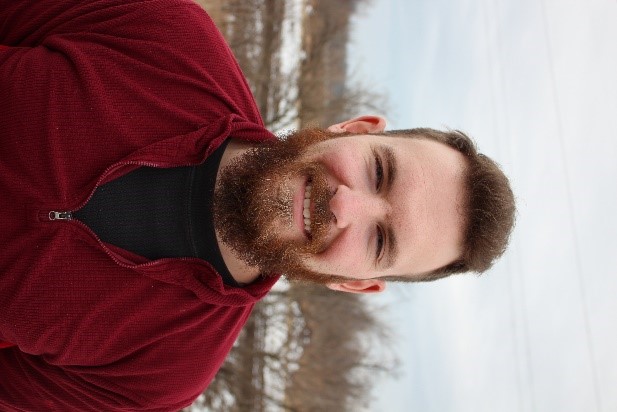
Nick Frillman joined Illinois Extension in January as a Local Foods and Small Farms Educator serving Woodford, Livingston and McClean counties. He will work to develop and deliver research-based programs, collaborate with small farm producers and partners, and extend university resources in Central Illinois. A fourth-generation graduate from University of Illinois, Frillman has a B.A. with a double major of Political Science and Spanish and a M.S. in Crop Science with a focus on crop production. Before joining Illinois Extension, Frillman completed a field season of CSA and farmers’ market style production at a small “beyond-organic” vegetable farm in Sandy, Oregon.
His research focuses on non-chemical weed control strategies, and establishment, monitoring and harvesting strategies for black currant and other woody perennial crops.
“I enjoy doing research projects that can have powerful and positive consequences for small farms and local businesses,” Frillman says. “As an Extension educator, I am excited that my research and work will serve producers directly.” Frillman plans to provide programs related to non-chemical weed control strategies, soil fertility, solanaceous vegetable production, cover cropping, and market development strategies for food-grade grain.
Nick is based in the Extension office in Bloomington, IL, and can be reached at 309-663-8306 or by email at frillma2@illinois.edu, so be sure to reach out and welcome him to the Illinois specialty crops family.
Illinois Pesticide Applicator Training and Testing
From the Illinois Extension Pesticide Safety Education Program. If your Illinois Pesticide Applicator license expired in 2019 or 2020, you will need to renew. There will be no in-person PSEP Training Clinics again this year and only limited in-person testing sessions for 2020-2021. Training has moved to an online format and have been designed to prepare applicators and operators for certification exams, and they can be completed at your own pace. Testing will also be online and exams for every category of licensure will be available by early 2021. Exam sessions will be individually scheduled with a remote proctoring service. In-Person Testing will be available on a limited basis, starting January 2021 at the earliest. For complete details https://extension.illinois.edu/psep/training-testing
Growers are encouraged to register early and plan ahead if they need to renew. You have to create two accounts if you want to do the training and testing online (on account for each). This is all addressed at the website above but does take a little time hence the advice to plan ahead and not wait.
M-CERF Illinois Producer Survey
M-CERF Illinois Producer Survey
University of Illinois Extension Cook County is collaborating with researchers from Illinois Institute of Technology and DePaul University, who are mapping the contributions of local farmers and food producers within a 300 mile radius of Chicagoland. Other partners include Chicago Food Policy Action Council and the Illinois Stewardship Alliance.
The survey is designed to understand what types of “good food” practices local farmers are already doing and the benefits and challenges of implementing such practices. “Good food” practices relate to safety, nutrition, environment, labor, animal welfare and local economy, and are increasingly in demand by institutional and retail customers.
Individual response will be CONFIDENTIAL and only the aggregated results will be shared with participants and stakeholders. Farmers will be able to see how they compare to their peers across the region. Other stakeholders will use the results to inform outreach and training to enable more local farmers to participate in “good food” purchasing contracts with Chicago and Cook County institutions, as well as sell to food hubs and aggregators interested in such practices.
As a token of appreciation for farmers time and willingness to share information, a $20 gift card will be offered to the first 200 farmers who complete the survey. If you are a farmer (urban or rural) within a 300 mile radius of Chicago please click this link to participate.
Kathryn Pereira (773-233-2900; kpereira@illinois.edu)
Regional Reports
From southwestern Illinois (Waterloo)… Winter has been fairly calm and uneventful in this part of the state. We had a few rounds of light snow, just enough to bring a white cast to the ground, a few times but nothing more than that About a week ago we had a run of very cloudy, gloomy days, but since we finally had a break with some sunshine the last few days. Temperatures have varied but overall, I would say average to a little above. Mostly our highs have been in the 30s and 40s with a few days getting up to about 50°. Lows have mainly been in the 20s at the coldest, with just a couple of nights colder than that. The ground has froze a little on top a few nights but not froze reliably to the point you could get out with equipment on ground that would otherwise be too soft. We haven’t had the typical spell of subfreezing days that most winters bring as of yet. We are far from out of the woods so time will tell. We really have not had any significant precipitation in the last week or two and the soil is starting to get dry enough to support equipment and pruning work without being a mess.
There is not a lot going on out in the field besides some pruning and maintenance on our fruit crops. As we get closer to spring it will be time for some of our last dormant sprays on fruit crops before bud break. Refer to the Midwest Fruit Pest Management Guide for more details on products and timings for these applications. Cover crops are in that typical mid-winter holding pattern until we break for warmer conditions closer to spring. Under cover many have or will be thinking about starting some early vegetable transplants soon. Within the next month many tomatoes and peppers will be started in the greenhouse, especially for high tunnel transplants.
I want to make a quick plug for two items I wrote later in this issue: videos released from our pumpkin variety trial and a call for application to host an on farm no-till demonstration trial for no-till transplanting of tomatoes or peppers. Please take a look at these articles if this interests you!
Nathan Johanning (618-939-3434; njohann@illinois.edu)
From southern Illinois (Murphysboro)… There is not much activity going on outside here at Jackson County, but these sunny mid 40s days have me itching to get back into the field. We do still have some greens including kale, swiss chard, and spinach. There are also 2 parsley varieties that we overwintered in the tunnel, and I have a single floret on the broccoli I transplanted. As I said, we have mostly had high 30s to 40s temperatures during the day, with only a few truly cold days and nights. The next two weeks are forecasted in the 40s with night temperatures in the upper 20s. I am pouring over seed catalogs and making trial plans for the 2021 growing season.
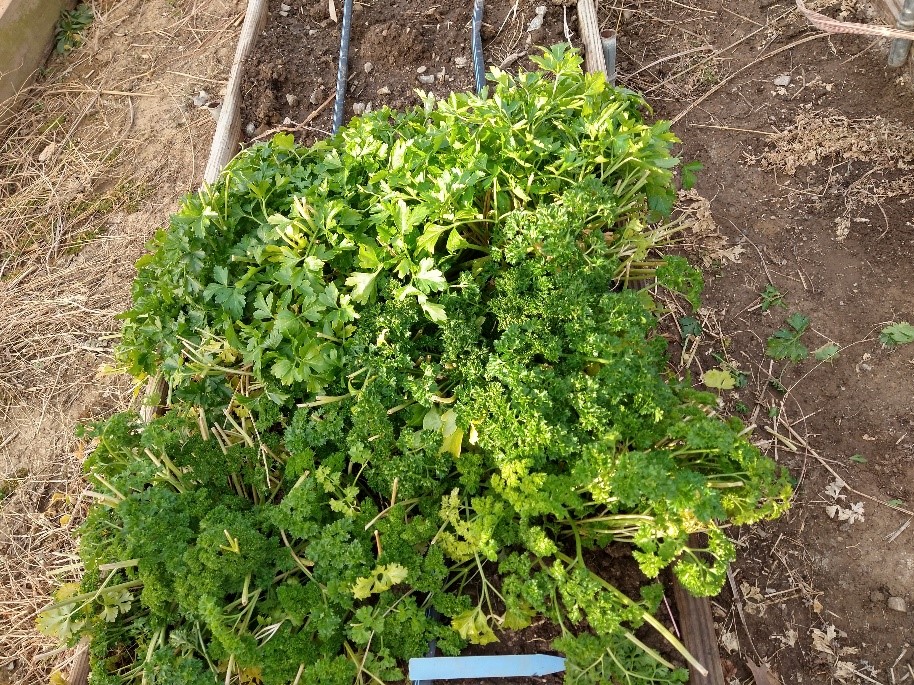
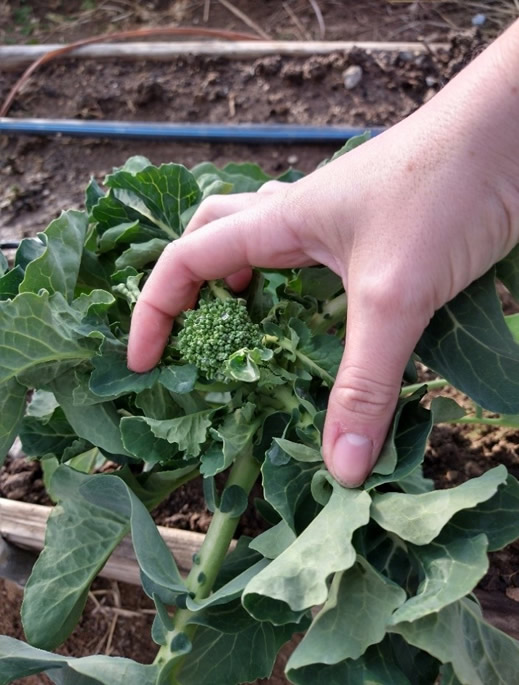
Photos: (left) overwintered parsley; (right) broccoli floret from high tunnel at Jackson Co. Extension office. Photos by K. Bell.
One thing I have been doing in the high tunnel is cleaning and reorganizing. I have harvested all the carrots, beets,
and radishes that were planted this fall and removed any of the debris left over. Now is also a good time to pull weeds, remove any other old plants, and any other trash. I have also been going over the high tunnel checking for wear and tear and any winter damage. Make sure seeding trays and pots are clean, and if you are recycling trays they should be cleaned and disinfected.
Katie Bell (618-687-1727; klbell@illinois.edu)
From Dixon Springs Ag Center…Activities during the last month, while at a slower pace than during the busy summer months, include cleaning and sanitizing various components within the hydroponic system (dutch buckets, lettuce table rails, irrigation plumbing, trellis spools, etc.), finalizing seed and supply orders, seed starting, and caring for the crops growing in the high tunnels over the winter.
The mushroom demonstration plots have not produced any mushrooms yet. Temperature fluctuation has been extreme within the tunnel, ranging from 70s-80s in the sun to nighttime temperatures down in the mid-20s. The first week of January, we added supplement to the mushroom plots, applying either cottonseed meal, rice bran meal, or soybean meal. We then added an inch of peat moss over the top. Since there has been a few spots of some other mold or fungus growing that watering seemed to kill, the plots were watered in after topping with peat moss.
Growth on the lettuce, spinach, kale, and carrots has been almost non-existent, but as of the end of last week, daylight hours have increased enough to hit the magic 10 hours/day mark, and we expect to start seeing more growth as over the next couple of weeks as the plants begin to respond to the longer days. We are still having rodent issues in a couple of rows within the tunnel. Feeding damage from either a vole, mouse, or rabbit (or a combination) within a few of the research plots is pretty severe. Repellants and trapping have not been successful to date so the next control measure will be bait stations. I believe the most damage is coming from voles enjoying the warm black plastic mulch canopy we created for them. We had been fortunate to not have much insect pressure, but this past week a spray application of BeLeaf was made to knock back an increasing aphid population.
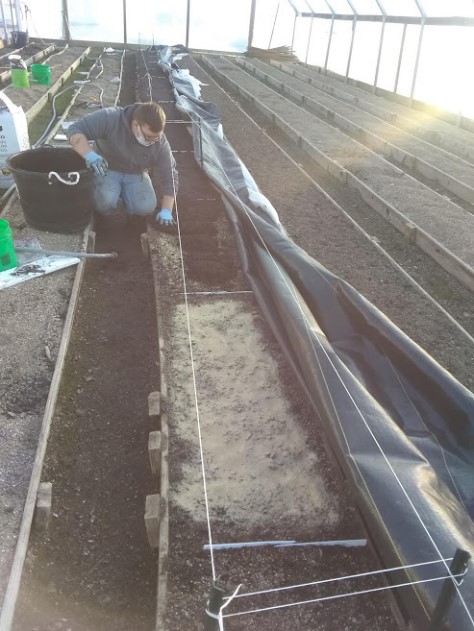
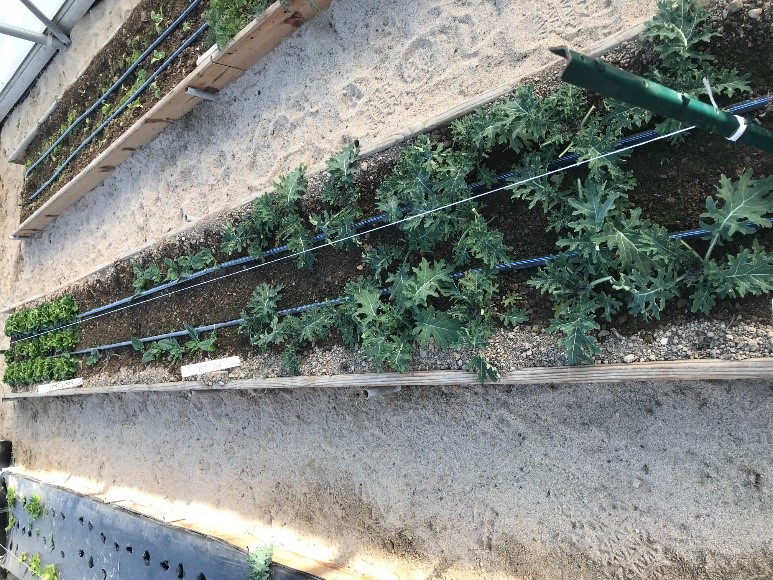
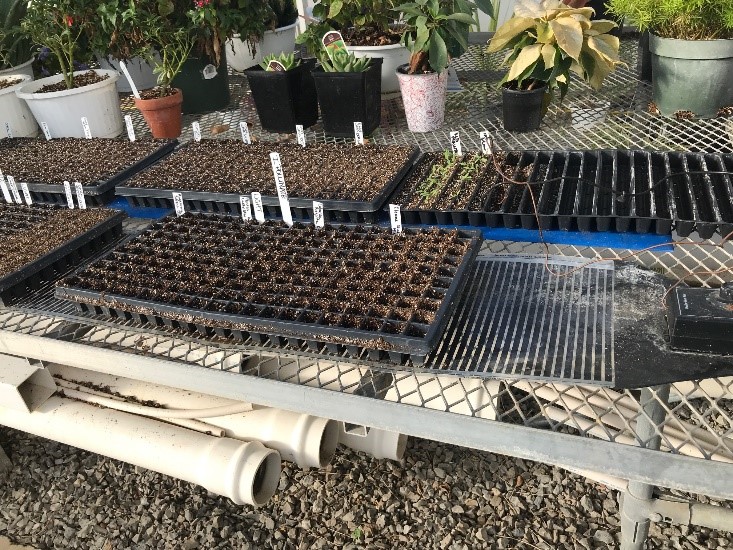
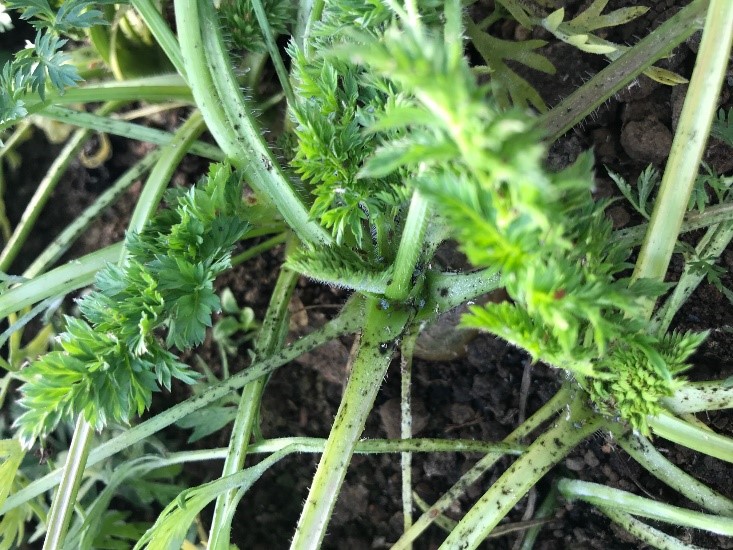
Top left: Remington Curry, high school intern, spreading peat moss over supplements in mushroom plots at DSAC. Top right: rodent damage in winter vegetable plots at DSAC with worst damage seen in the plastic plots.
Bottom left: vegetable, herb, and pollinator plant seeds being germinated using a heat mat at DSAC.
Bottom right: carrot tops infested with aphids in high tunnel at DSAC. Photos by B. Aly
Bronwyn Aly (618-382-2662; baly@illinois.edu)
Fruit & Vegetable Production & Pest Management
Farms needed for No-till, Cover Crop Tomato & Pepper Demonstration Trials
We are in need of some host farms to trial no-till transplanting of tomato or peppers! Through an Illinois Specialty Crop Block Grant, we are doing research on integrating cover crops into bareground, plasticulture and no-till production of tomatoes and peppers. In addition to replicated research trials, we plan to do some on-farm demonstrations of the no-till transplanted crops to introduce this to growers and help spread the understanding of how to integrate no-till into these systems.
We are now accepting applications from growers (predominantly from IL, but others may be considered) who would be willing to host a trial strip of some no-till transplanted crops. Here are just a few expectations we would have for this trial.
- Grower would have some established cereal grain (cereal rye preferably, but wheat, barley or triticale also would work)
- Be willing to leave a strip (amount of area is flexible, but ideally 0.1 ac or more) to grow to heading and then no-till transplant into (tomatoes and/or peppers) and compare beside any standard production practice (bareground, plasticulture, etc.)
- Collect some basic data on yield and provide grower feedback on management between standard and no-till system.
- Work with myself to host a small on-farm meeting (if COVID guidelines allow) and/or record some video observations we can share with other growers.
We will bring our no-till transplanter to you for planting and help with getting things set up. We will coordinate ensuring we have transplants and other details. You would need to have roughly a 40-50 hp (minimum) tractor to pull the transplanter.
To apply please email Nathan Johanning at njohann@illinois.edu. Provide your name, contact information and location of the farm, along with a short paragraph describing your farm and why you would like to trial no-till production. For first priority, please email by February 10, 2021. Please contact me if you have any further questions about the project!
Nathan Johanning (618-939-3434; njohann@illinois.edu)
2020 Pumpkin Variety Trial Yields & Videos Released
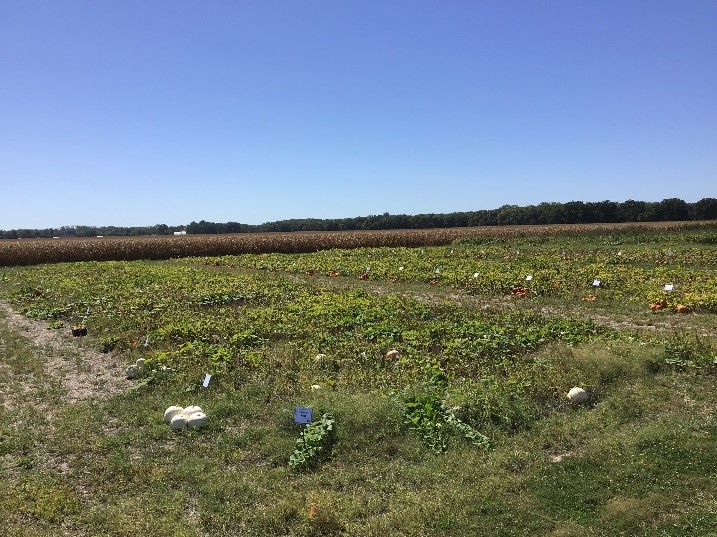
We now have three new, in-field, videos release of our 2020 Pumpkin Variety Trials at the Belleville Research Center. These were taken at the end of September after all of the plots were harvested with over 50 different varieties of specialty and Jack-O-Lantern pumpkins. Also, the observational yield data is in the table below. Hopefully these will be helpful in your variety selection for the 2021 season!
2020 Specialty Pumpkin Trial https://www.youtube.com/watch?v=3YLmUx20fws
2020 Medium Jack-O-Lantern Trial https://www.youtube.com/watch?v=V79jdY07CPI
2020 Large Jack-O-Lantern Trial https://www.youtube.com/watch?v=SmVBXDz9s8g
| Variety | Source1 | Average Fruit Weight (lbs) | Yield (No. fruit/plant) |
Color | |
Specialty Pumpkins |
|||||
| 1 | Autumn Buckskin |
SW |
10.7 | 1.2 | Tan |
| 2 | Blue Doll | SW | 11.6 | 0.8 | Blue |
| 3 | Colorado Sunrise | RI | 9.3 | 1.4 | Blue w/ Pink |
| 4 | Fairytale | SW | 11.2 | 1.0 | Green (Tan at Maturity) |
| 5 | Flat White Boer | RI | 8.2 | 0.8 | White |
| 6 | Jewel Box | SW | 13.3 | 0.6 | Tan w/Warts |
| 7 | Mellow Yellow | SW | 8.2 | 1.6 | Light Yellow |
| 8 | Moonshine | SW5.6 | 1.6 | White | |
| 9 | Moon Stacker | RI | 11.3 | 1.0 | White |
| 10 | One Too Many | SW | 21.4 | 0.4 | White w/ Red/Orange Veins |
| 11 | Peanut | SW | 11.6 | 0.8 | Pink w/ Brown/Callused Warts |
| 12 | RPX 6889 (Fright) | RU | 15.0 | 1.4 | Orange w/ Green Warts |
| 13 | RPX 6927 (White Gold) | RU | 5.1 | 1.2 | White |
| 14 | RPX 6229 (Fools Gold) | RU | 9.5 | 1.0 | Tan |
| 15 | Specter | HM | 11.5 | 1.2 | Creamy White w/ Some Warts |
| 16 | New Moon | HO | 21.5 | 0.8 | White |
| 17 | Polar Bear | JO | 28.9 | 0.8 | White |
Medium Jack O’Lantern (Under 25 lbs) |
|||||
| 18 | Bayhorse Gold | RU | 15.0 | 1.2 | Dark Orange |
| 19 | Bellatrix | SW | 15.7 | 1.0 | Medium Orange |
| 20 | Carbonado Gold | RU | 12.4 | 1.8 | Dark Orange |
| 21 | Cargo | JO | 15.8 | 1.0 | Dark Orange |
| 22 | Eagle City Gold | RU | 15.5 | 2.0 | Dark Orange |
| 23 | Early Prince | SY | 9.8 | 2.6 | Dark Orange |
| 24 | Eros | SW | 13.3 | 1.2 | Dark Orange |
| 25 | Gladiator | HM | 12.1 | 1.2 | Dark Orange |
| 26 | Hermes | HM | 11.0 | 1.8 | Dark Orange |
| 27 | Kratos | HM | 14.2 | 1.2 | Dark Orange |
| 28 | Magic Wand | HM | 12.5 | 1.6 | Dark Orange |
| 29 | Orange Sunrise | HM | 16.8 | 0.8 | Medium Orange |
| 30 | Renegade | JO | 13.2 | 1.4 | Dark Orange |
| 31 | Rhea | HM | 15.9 | 1.0 | Dark Orange |
| 32 | RPX 6208 | RU | 16.9 | 0.8 | Dark Orange |
| 33 | RPX 6209 | RU | 12.5 | 1.8 | Dark Orange |
| 34 | Secretariat | SW | 12.4 | 3.0 | Medium Orange |
| 35 | SIU - 4 | SIU | 8.9 | 0.8 | Light Orange |
| 36 | SIU - 5 | SIU | 14.2 | 1.4 | Orange |
| 37 | SIU - 7 | SIU | 16.3 | 1.0 | Orange |
| 38 | SIU - 15 | SIU | 14.7 | 1.6 | Medium Orange |
| 39 | Skidoo Gold | RU | 11.8 | 2.0 | Dark Orange |
| 40 | Spartacus | SK | 17.4 | 0.6 | Dark Orange |
| 41 | Spartan | SW | 12.8 | 1.6 | Dark Orange |
| 42 | Zeus | HM | 11.9 | 1.8 | Dark Orange |
Large Jack O’Lantern (Over 25 lbs) |
|||||
| 43 | Big Doris | SW | 22.5 | 1.2 | Dark Orange |
| 44 | Cronus | HM | 17.3 | 1.2 | Dark Orange |
| 45 | Hulk | SW | 20.4 | 0.6 | Dark Orange |
| 46 | Igor | JO | 17.7 | 1.4 | Dark Orange |
| 47 | Large Marge | SW | 25.2 | 1.2 | Medium Orange |
| 48 | PM 0003 (PM 1745) | SY | 25.8 | 1.6 | Dark Orange |
| 49 | RPX 6883 | RU | 23.5 | 1.2 | Dark Orange w/ Green Warts |
| 50 | XPU 6002 | SK | 19.1 | 1.0 | Medium Orange |
| 51 | XPU 7704 | SK | 24.4 | 1.4 | Dark Orange |
1Seed Sources: HM=Harris Moran/HM Clause, HO=Hollar, JO=Johnny’s, RU=Rupp, RI=Rispens, SIU= SIU/S. Alan Walters, SK=Sakata, SW=Seedway, SY= Syngenta |
|||||
Thanks to the Illinois Specialty Growers Association & Illinois Vegetable Growers Association for financial support and to all of the seed companies for their seed and financial contributions to this research:
- Harris Moran/HM Clause https://hmclause.com/
- Hollar Seeds http://www.hollarseeds.com/
- Johnny’s Selected Seeds https://www.johnnyseeds.com/
- Rispens Seeds, Inc. https://www.rispensseeds.com/
- Rupp Seeds https://www.ruppseeds.com/
- Sakata Seeds https://www.sakata.com/
- Seedway, LLC https://www.seedway.com/
- Syngenta https://www.syngenta-us.com/
Nathan Johanning (618-939-3434; njohann@illinois.edu)
Weather Review: Warm, Dry End to 2020
December was much warmer and drier than average across Illinois. The preliminary statewide average December temperature was 32.8 degrees, 2.9 degrees above the 30-year normal and tied for the 35th warmest on record. Preliminary statewide average total precipitation for December was 1.78 inches, 0.91 inches less than the 30-year normal, and the 43rd driest on record.
Outlooks
After an active start to January, the Climate Prediction Center’s 8- to 14-day outlooks indicate the highest odds of a change to warmer and drier than normal conditions across the state into the second week of January.
The outlooks for the entire month of January lean toward warmer and wetter than normal conditions, suggesting a change to more active winter weather around the middle of the month.
As La Niña conditions are expected to persist into early spring, forecasts from the North American Multi-model Ensemble for February through April favor warmer and wetter conditions through the winter-spring transition.
For the full, detailed monthly overview, including regional details and maps of statewide data, visit the Illinois State Climatologist Website at https://stateclimatologist.web.illinois.edu/
Trent Ford, Illinois State Climatologist (217-244-1330; twford@illinois.edu)
For over 30 years, asparagus growers have known about male hybrid varieties that have overtaken the yields of the open-pollinated varieties like Mary Washington. These male hybrids have out-yielded the open-pollinated varieties by 3 to 1. Growers can then start to recoup the costs of their investments earlier.
The New Jersey male hybrids have been very popular with growers since the mid-1980’s with varieties such as Jersey Giant, Jersey Supreme, Jersey Knight, and others. Unfortunately, these varieties will no longer be on the market in the future, and it is safe to say that most of the “Jersey” varieties will not be available within the next 3-5 years, with the exception of Walker Deluxe.
New male hybrid varieties for commercial growers will include Walker Deluxe, Atlas, Greenox, Sequoia, Porthos, and Purple Passion, along with Guelph Eclipse, Guelph Equinox and Guelph Millennium. The Guelph varieties are from the University of Guelph, Ontario, Canada. They produce longer spears than the NJ types that retain tight spear tips that are tender. They also tolerate hot summer temperatures and can withstand cold winter temperatures. Greenox, Sequoia, and Porthos were released from Rutgers University and Vilmorin Seed Co. Walker Deluxe is from Walker Plants and performed the best in the first year of my asparagus variety trial in PA (see table below). Atlas is not a male hybrid but is dioecious, having both male and female plants. It produces tall spears with tight spear tips under warm temperatures but do not tolerate cold winter temperatures like the NJ and University of Guelph types.
Asparagus Cultivar Trial – Selinsgrove, PA
Carl Cantaluppi, Retired Area Horticulture Agent
North Carolina Cooperative Extension Service
2020
| Cultivar | Lbs./A greater than 3/8 inches in diameter | Lbs./A less than 3/8 inches in diameter | Number of spears per plant | Total yield per acre in pounds |
| Walker Deluxe | 250ab1 | 344a | 3.7a | 594a |
| Guelph Millennium | 113 b | 119 b | 1.4 b | 232 b |
| Guelph Eclipse | 380a | 119 b | 2.3 b | 499ab |
1Yield expressions with the same letter within columns are not statistically significant, Duncan’s Multiple Range Test, 5% level.
One-year-old crowns were planted on April 19, 2019. Eight harvests were taken throughout a three-week period in 2020. First harvest occurred on April 16. Harvest did not resume until May 1 due to frosts. Last harvest occurred on May 8 when the majority of spear diameters started to become less than 3/8 inches in diameter.
A List of Asparagus One-Year-Old Crown Sources and Variety Availability
Scott Walker
Walker Plants
105 Porchtown Rd.
Pittsgrove, NJ 08318
856-358-2548
www.walkerplants.com
Walker Deluxe, Atlas
Tim Nourse
Nourse Farms, Inc.
41 River Rd.
South Deerfield, MA 01373
413-665-2658
www.noursefarms.com
Guelph Millennium, Jersey Supreme, Jersey Knight, Purple Passion
David Daisy
Daisy Farms
28355 Michigan 152
Dowagiac, MI 49047
269-782-6321
www.daisyfarms.net
Porthos, Greenox, Sequoia, Guelph Millennium, Guelph Eclipse, N.J. Hybrids
Richter Farms, LLC
Rt. 2
90487-60th St.
Decatur, MI 49045
269-782-5350
New Jersey Hybrids
Indiana Berry and Plant Co.
2811 Michigan Road
Plymouth, IN 46563
1-800-295-2226
www.indianaberry.com
Guelph Millennium, Jersey Knight, Purple Passion
John Bakker
Michigan Asparagus Research, Inc.
12800 Escanaba Drive, Ste. A
DeWitt, MI 48820
Hart office: 231-873-2740
www.foxseeds.com
Seed of Guelph Millennium, Guelph Equinox, Guelph Eclipse
This source list is intended only as a convenient reference for growers. Inclusion in the list does not imply endorsement, nor does exclusion imply that the plants or seed of a particular source are inferior. The list does not pretend to be exhaustive, and undoubtedly there are other suitable sources of crowns and seed.
For a complete guide to asparagus production, management, and marketing, order my publication, “Asparagus Production From A to Z” by contacting Carl Cantaluppi at carl1954@ptd.net
Carl Cantaluppi, Retired Area Horticulture Agent, North Carolina Cooperative Extension Service, (carl1954@ptd.net)
Less Seriously
A few newspaper headlines to give us all a little laugh to start off 2021
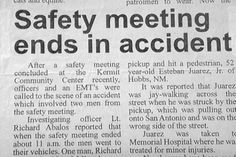
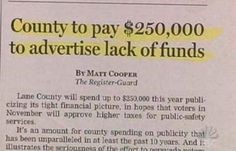
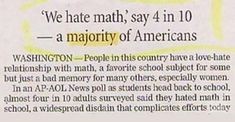
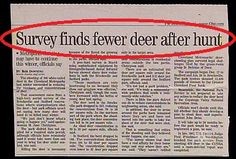
University of Illinois Extension Specialists in Fruit and Vegetable Production & Pest Management
Extension Educators – Local Food Systems and Small Farms |
||
Bronwyn Aly, Gallatin, Hamilton, Hardin, Pope, Saline, and White counties |
618-382-2662 |
|
Katie Bell, Franklin, Jackson, Perry, Randolph, & Williamson counties |
618-687-1727 |
|
Sarah Farley, Lake & McHenry counties |
847-223-8627 |
|
Nick Frillman, Woodford, Livingston, & McLean counties |
309-663-8306 |
|
Laurie George, Bond, Clinton, Jefferson, Marion, & Washington counties |
618-548-1446 |
|
Zachary Grant, Cook County | 708-679-6889 | |
Doug Gucker, DeWitt, Macon, and Piatt counties |
217-877-6042 |
|
Erin Harper, Champaign, Ford, Iroquois, and Vermillion counties |
217-333-7672 |
|
Grace Margherio, Jackie Joyner-Kersee Center, St. Clair County |
217-244-3547 |
|
Grant McCarty, Jo Daviess, Stephenson, and Winnebago counties |
815-235-4125 |
|
Katie Parker, Adams, Brown, Hancock, Pike and Schuyler counties |
217-223-8380 |
|
Kathryn Pereira, Cook County |
773-233-2900 |
|
James Theuri, Grundy, Kankakee, and Will counties |
815-933-8337 |
|
Extension Educators – Horticulture |
||
Chris Enroth, Henderson, Knox, McDonough, and Warren counties |
309-837-3939 |
|
Richard Hentschel, DuPage, Kane, and Kendall counties |
630-584-6166 |
|
Andrew Holsinger, Christian, Jersey, Macoupin, & Montgomery counties |
217-532-3941 |
|
Extension Educators - Commercial Agriculture |
||
Elizabeth Wahle, Fruit & Vegetable Production |
618-344-4230 |
|
Nathan Johanning, Madison, Monroe & St. Clair counties |
618-939-3434 |
|
Campus-based Extension Specialists |
||
Kacie Athey, Entomology |
217-244-9916 |
|
Mohammad Babadoost, Plant Pathology |
217-333-1523 |
|